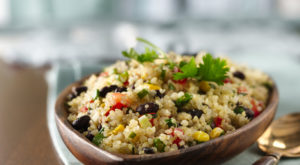Toni Colley-Perry, a teacher for African Heritage cooking classes, is introducing her community to new and tasty ways to eat traditional dishes. One of the meals she and her cooking students enjoy is red pepper couscous and ginger-spiced quinoa. Colley-Perry teaches those who enroll in her cooking class that traditional spices and seasonings can be used to create healthy and delicious dishes.
She encourages students to “switch out, switch over” by taking traditional ingredients and replacing them with more wholesome ones. The “switches” include using whole grain pasta for traditional white pasta, potatoes or white rice. Colley-Perry stated that she wants these types of health trends to become popular in Sacramento, because everyone can benefit from them. The African Heritage cook classes last for six weeks and were created by Oldways, a nonprofit group based in Boston that was established in 1990. The goal of Oldways is to reconnect Americans with classic cooking methods that are healthier than today’s dishes, which are often filled with processed foods that are high in fat and salt. Oldways also sponsored African Heritage cooking classes in Fresno, Long Beach and San Francisco.
Sara Baer-Sinnott, the president of Oldways, stated that there are too many Americans who are out of touch with home-cooked food and a plant-based diet. This is a main reason why Americans are experiencing higher rates of obesity, chronic conditions and heart disease.
Oldways started creating several ethnic food pyramids, based on the U.S. food pyramid, over two decades ago. The new food pyramids feature African, Latin American, Asian and Mediterranean foods. Culinary experts and nutritionists from the Harvard School of Public Health, as well as other universities, worked together to develop these culturally relevant pyramids that feature healthy grains, nuts, vegetables and fruits. Each of the meals suggested for these pyramids feature bold flavors but are low in salt. Olive oil is the preferred ingredient for cooking in most instances, and dairy, meat and sweets are minimized in the meal plans.
Baer-Sinnott emphasizes that the food suggestions are more than just a campaign to get Americans to consume more vegetables, and states that “all of the pyramids are based on a healthy foundation of gardening, walking and running, cooking, eating with family.”
The fact that Americans consume large amounts of fast food and processed foods is also an issue. Nutrition experts have warned the public of the dangers of such a vitamin and mineral-deficient diet, and suggest that people should cook at home more, using fresh ingredients. The African Heritage pyramid features whole grams like millet and brown rice, along with kidney and black-eyed peas, cassava, yams and a variety of leafy greens, including collards and dandelion. Foods should be seasoned with wholesome ingredients like onions and garlic, according to the pyramid.
Avion Weaver, an adult program director for St. Paul Missionary Baptist church, is also hosting an African Heritage coking class soon. Weaver states that “getting back to whole foods is crucial to getting us back to a better state of mind and health.”
The food pyramids created by Oldways don’t eliminate meat, but they do encourage eating meat in smaller amounts. Using meat as a flavoring agent for foods, instead of as an entrée, is also recommended. For instance, collard greens can be cooked with garlic, olive oil and lemon juice as a healthier alternative to bacon fat.
Today’s culinary trend of using multicultural ingredients is part of what is making the African Heritage cooking classes so popular. Packaged Facts, a consumer market research firm, indicates that ingredients from various parts of the world are “fueling some of the most compelling trends in the culinary landscape” and this is, fortunately, very likely to continue.



